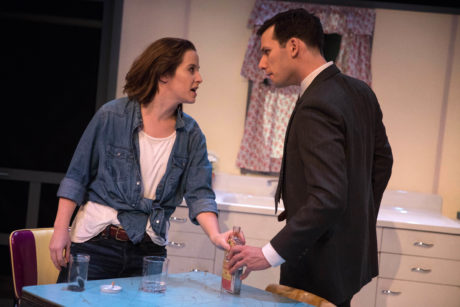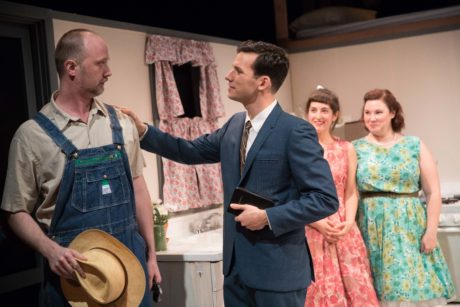One of Shakespeare’s greatest gifts is the inspiration he offers to other artists. In the case of Tame., playwright Jonelle Walker has captured the essence of Shakespeare’s Kate in The Taming of the Shrew; wild, uncontrollable and ultimately fascinating. This is the key to the success of WSC Avant Bard’s dynamic production. “They call me Katherine that do talk of me,” Kate says to Petruchio, in one of Taming’s most famous lines. Cat (Jill Tighe), in 1960 Texas, is a lesbian whirlwind who has taken refuge in her family’s Bible-quoting home after a personal tragedy. Cat tells us “When I was 11 years old, I carved a straight line into my forehead with my Daddy’s pocketknife. I locked eyes with that girl in the mirror and never let her go.”
Some argue that the popularity of Taming lies in the irresistible spectacle of a spirited woman being brought under control. I contend that it is the opposite. Kate’s fierce passion is what makes her intriguing. As Cat, Jill Tighe is a wounded animal, kicking, screaming, and fighting for herself in the only way she knows how. She has been expelled from Smith, where she no doubt hoped to escape her East Texas upbringing. After a failed attempt to conquer New York, where she hung out with beatniks and junkies, she has come home to collapse and find her footing again. This does not prevent her from raging against her family’s insensitivity. As Cat, Tighe has an arresting presence, and takes advantage of every opportunity to make unusual choices.

Cat, unlike Shakespeare’s Kate, has a mother, Meredith (Karen Lange) who is well-meaning but somewhat intimidated by her ferocious daughter and stoic husband. Lange portrays Mama with a sure grasp of both the good and the bad in her character. She flutters around helplessly, trying to be useful, bonding with her more compliant daughter Bea (Madeline Burrows). One could attribute Kate’s wildness in the Shakespeare play to the absence of a soothing maternal figure, but such a lack seems to have no effect on Bianca. In place of no mother, Cat has the wrong mother; Cat and Mama are a mother and daughter who just don’t “get” each other.
Bea, based on Shakespeare’s Bianca, has marriage on her mind, but instead of a gaggle of suitors she has one, local minister-in-training Patrick (Brendan Edward Kennedy). Burrows shows real distinction as an actress in the role of Bea, as she struggles for what she fondly imagines will be her future happiness. Daddy (John Stange) works on an oil rig and is away much of the time. There is a kinship between him and daughter Cat, both strong personalities, although he is clearly unhappy with her angry adult persona. Stange, in a fine performance, makes his presence felt with few words, believing he is in firm control of his patriarchal household.
Mama has lately become enamored of Patrick, who has a secret relationship with Bea. Patrick is a Christian true believer with a questionable past who takes on the thankless task of “taming” Cat to keep her from lashing out constantly at her loved ones. Patrick’s tense, challenging, sometimes violent attempt to redeem Cat is the heart of the play. It is a dance of death, and both actors give everything they have to it. Kennedy is able to switch in a moment from polite suitor to predatory mentor. Cat, for her part, revels in defying him, although the odds are of course stacked against her. Shakespeare’s Kate is well-matched by her flamboyant lover, Petruchio, a man in a hurry, who turns every day into Opposite Day in his quest for love. Cat is suffering from a loss and deeply depressed from the beginning. Patrick’s efforts to change her feel like, and sometimes are, an assault. As Cat, Tighe, who can turn the word “Mother” into a snarl, gives as good as she gets, and the fact that she is gay makes the sexual tension appealingly ambiguous.
Walker has a fine ear for Southern culture and evangelical protestations of faith. Religion plays no role in Shakespeare’s play, but it can be an unparalleled instrument of oppression and works as such here. Cat’s family seems to care about her, but they are utterly unable to decide what to do with her. Baptista in Taming, though eager to sell both daughters off, does tell Petruchio that Kate’s love is “all-in-all.” And he pays for both girls’ educations. So he clearly cares about his daughters too. As tormented as these families are, lack of love is not the root of the conflict.

Kate and Bianca, as well as Cat and Bea, echo a tradition of unconventional women paired with more dutiful sisters (Antigone and Ismene, for example, in Sophocles’ Antigone). Cat, unlike Kate, is an artist, so she has an outlet for her intense energies, and many more options than an Elizabethan woman. In both plays, authority is clearly in male hands. In Shakespeare, we have a complex comedy with three couples and much wordplay; in Walker, we have a family struggling with tragedy, secrets, love, and hate. The key element is wit, which both Kate and Cat have; although neither one uses their powers for good.
In literature, when women are being tamed, something is usually taken away from them. In dramas where the bad boy turns into a responsible man, he can still focus on himself and his fate and live in the center of his own story. Too often women in the same situation suffer a tragedy, or are placed in a conventional marriage at the end of the play. Walker has given Cat a future which I do not want to give away. But there is no doubt that the ending is artistically the right one.
Director Angela Kay Pirko has given the play vibrant and subtle production which brings out the strengths of Walker’s writing beautifully. Set designer Eric McMorris has created a plausible design for the period, which is detailed and suggestive of character. Lighting Designer E-hui Woo, Costume Designer Danielle Preston, and Sound Designer Mehdi Raoufi all contribute to give us that “you-are-there” feeling we want to have at a realistic play.
Kate and Cat, like hurricanes, come close to destroying everything in their path. But the world would be much less interesting without them.
Running Time: Approximately two hours, with one intermission.
TAME. plays through December 11, 2016, at Avant Bard performing at Gunston Arts Center, Theatre Two – 2700 South Lang Street, in Arlington, VA. For tickets, call the box office at (703) 418-4808, or purchase them online.
LINKS:
Review: ‘TAME.’ at Avant Bard by David Siegel.
Meet the Cast of Avant Bard’s ‘TAME.’ Part 1: John Strange by Joel Markowitz.
Meet the Cast of Avant Bard’s ‘TAME.’ Part 2: Brendan Edward Kennedy by Joel Markowitz.
Meet the Cast of Avant Bard’s ‘TAME.’: Part 3: Jill Tighe by Joel Markowitz.
Meet the Cast of Avant Bard’s ‘TAME.‘ Part 4: Madeline Burrows by Joel Markowitz.





